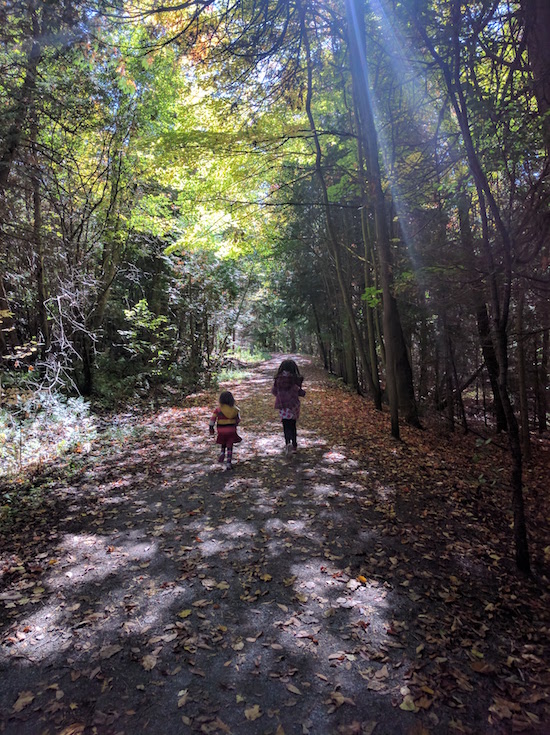October 13, 2016
On Blogs and Food Blogs: a Conversation with Emily Wight
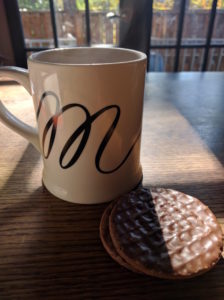 Emily Wight is author of the cookbook, Well Fed Flat Broke, which is the cookbook that taught me what people are talking about when they talk about reading cookbooks for pleasure. She is also the longtime writer behind the blog of the same name, and I really admire her work and her perspective on blogging.
Emily Wight is author of the cookbook, Well Fed Flat Broke, which is the cookbook that taught me what people are talking about when they talk about reading cookbooks for pleasure. She is also the longtime writer behind the blog of the same name, and I really admire her work and her perspective on blogging.
I’d always wondered if my own philosophy of blogging (that blogging should be easy, fit nicely into your life, never be a chore…) was relevant to food blogging. Emily was kind enough to answer my questions about food blogging, and blogging in general, and what it means to be an old school blogger still at it in 2016.
*****
Dear Emily,
I really admire your blog, your book, and all you do, and it occurs to me that you might the perfect person for something I’ve been wanting to do for a while. I teach a blogging course at UofT and think about blogging a lot, have all kinds of theories about blogs as a radical space, for women in particular. and how blogs have certainly been hijacked by commercial interest. My favourite thing about blogs is there inherent messiness, how they’re works in progress, an exercise in making it up as you go along…
But I also know that this doesn’t quite work for food blogs. A lot of work is required for a food blogger. Whereas I see a blog as a great place to practice the art of imperfection, a food blogger has to get it right or else she’ll be messing up her readers’ dinners. There is also the nature of sponsorship…
Anyway, I would be really interested in reconciling my own ideas about blogging with the realities of food blogging and expanding my understanding of blogging in general. Would you be willing to engage in a back and forth email conversation over a few days to get some of these ideas flowing?
**
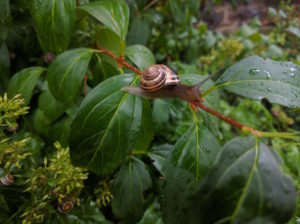 EMILY
EMILY
I’d be happy to help! But also food blogs can be messy and alive, it’s just harder to find them now. I really like Poor Man’s Feast and The Yellow House, but to be honest I’ve really moved away from reading a lot of food bloggers. By the time fall comes, I never want to see another recipe for squash soup as long as I live. I think the “why” behind food blogging has shifted from when I started one million years ago in 2007/08, certainly.
**
KERRY
Okay, so here is my first question. My whole deal is that blogging should be easy, it shouldn’t be a chore. If blogging is hard and taking up too much time, I preach, then you’re doing it wrong. But with food blogging—I suspect and as I’ve been told—there is recipe testing required, you can’t do typos (or else you can end up with a tablespoon of salt when it should have been a teaspoon). It’s a whole different game. Not to mention staging required for photographs… Has this been your experience? Is food blogging inherently hard? Is there a way to fit food blogging sustainably and easily into one’s life?
**
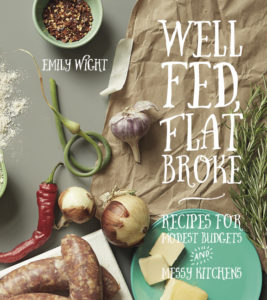 EMILY
EMILY
I don’t think food blogging is inherently hard—I have a much easier time of it than something like, say, fashion blogging, because I understand food but clothes remain a mystery to me. In most food blogging, food is the creative outlet—it’s a kind of art of its own, and so blogging about food is really just communicating a different form of expression, if that makes sense?
I think that people get satisfaction from different parts of it. I’m not a great photographer, so for me the staging and photographing is an afterthought, because no amount of effort in that regard is going to make my crappy iPhone photos significantly better; I think I’m a decent writer though, so I hope to coast on the quality of the writing and the recipes. For other people who are perhaps better photographers, maybe the writing feels hard.
In terms of accuracy and recipe development, that is a unique challenge but again I’d liken it to its own art form. Like, why would anyone do this if they weren’t either creating or archiving something? For me food blogging made sense—my education is in creative writing, but I am most excited about food, and we have to eat anyway. Food blogging became a way to write every day, or at least fairly often at a time when I might not have known what else to write about.
“Food blogging became a way to write every day, or at least fairly often at a time when I might not have known what else to write about.”
The challenge of sustainability now, I find, has less to do with the form and more to do with my own motivation. There’s a lot of “content” out there. I recognize that this is my own problem—food blogging is very different in 2016 than it was in 2008, and there are so many new voices that it can be hard to wade through and find your people. I won’t read on if I feel like a blogger is writing sponsored content, which is perhaps unfair, but again there is just so much out there now that I get to choose not to be marketed to if I don’t want that. At this stage, I am really looking for writers who make me look at food differently, or who use food as a vehicle for a larger story, whether there’s a recipe at the end or not.
**
 KERRY
KERRY
So interesting. I am also really invested in the idea of blogging as a process, and a never-ending one too. An opportunity to learn and grow. That is why I started blogging about books back in 2007ish. Which is definitely at odds with the way that most bloggers these days are urged to position themselves as experts and gurus. I feel like we don’t get to see any of the process anymore, that the process is regarded as mess, something to be swept into the corners.
Did you have any food blogger “credentials” when you started blogging back in the day? Were they even necessary? You talk about motivation for food blogging—do you think people blogging in 2016 are blogging for blogging’s sake, or are they blogging with the intention of a book deal or some other professional opportunity? And I want to know also—what motivates you to keep blogging after all this time?
**
 EMILY
EMILY
It’s totally a process! That’s why I don’t delete all my terrible, very bad posts with their clunky writing and hideous photos, because I like the idea that you can follow someone back through their process of growth. I remember when I first discovered The Bloggess in maybe 2009, and she was so funny and wonderful, and I had an evening alone (and no children), so I went all the way back through her archives and marveled at how her voice had strengthened and changed as she worked at it. There’s value in the process, and if nothing else it’s reassuring to be able to go back and see how you’ve evolved.
“I don’t delete all my terrible, very bad posts with their clunky writing and hideous photos, because I like the idea that you can follow someone back through their process of growth.”
I think the difference between then and now is really in how we’ve come to view online writing—the idea of “content” creates this sort of urgency to post regularly, to demonstrate value and expertise and keep people coming back. There has always been talk of “building an audience,” but prior to maybe 2011 the message was “make something valuable and people will come.” I don’t think that’s changed, but social media has really altered how that happens—now you don’t just have to make good blog posts, you also have to market them, and you—that was always kind of the case, but there’s so much more “content” out there now, that you have to put in a lot of effort—on a greater number of platforms—to stand out. If you want to do it well now, you have to think of yourself as a “brand” which honestly just feels so ridiculous. I get it, but I don’t want to do it.
“There has always been talk of ‘building an audience,’ but prior to maybe 2011 the message was ‘make something valuable and people will come.’ I don’t think that’s changed, but social media has really altered how that happens.”
Which is not to say that people who are doing it are doing blogging wrong, it’s just that the culture has changed. It does seem like people spring up fully formed overnight, with these beautiful sites and strong voices, but I wonder if part of that is that these are people who are approaching it with more online experience. When I started, I had had a Facebook account for maybe a year and that’s about it; I think now, for a lot of people, the social and visual aspects of blogging come pretty naturally. The technology is better—everyone has an iPhone now and iPhones take pretty good pictures. Getting to where you can be seen as an expert in whatever you’re doing is not such an investment as it used to be. “Anyone can do it” has turned into “anyone can do it well.”
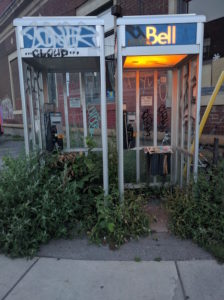 I didn’t really have much in the way of credentials when I started, short of a writing degree. But is a writing degree any less a credential than professional cooking experience, if the blog’s audience is the home cook? The people who did really well early on had really strong perspectives—people like David Lebovitz, or Luisa Weiss, or Pim Techamuanvivit (who has since quit blogging). They really created the model for what you see a lot of people doing now, and I think created a sense of what you can do if you do well online.
I didn’t really have much in the way of credentials when I started, short of a writing degree. But is a writing degree any less a credential than professional cooking experience, if the blog’s audience is the home cook? The people who did really well early on had really strong perspectives—people like David Lebovitz, or Luisa Weiss, or Pim Techamuanvivit (who has since quit blogging). They really created the model for what you see a lot of people doing now, and I think created a sense of what you can do if you do well online.
Do people blog just to blog, or do they want something else, like a book deal? I don’t know. I think people sit down and open a WordPress account for the same reason they ever did—a desire to connect, to write, or just to find their people online. But I think there is more of a sense that if this goes well, there are other opportunities in it. People take bloggers more seriously now than they did even a few years ago. You certainly see a lot of blogger cookbooks now, and they are often quite well done (and do very well).
“I think people sit down and open a WordPress account for the same reason they ever did. But I think there is more of a sense that if this goes well, there are other opportunities in it.”
As for me and why I still do it? Well, I certainly do it a lot less than I used to, because now I feel like I only want to write when I have something to say, or a recipe that’s really worth sharing, or to gauge whether what I’m working on is something people want to see more of. With other social media, like Instagram or Facebook, I still feel very connected to my community, so I spend a lot of time on there and other platforms. I treat my site as more of a portfolio—I don’t get paid to write on my blog (I don’t do ads or sponsored posts), but it generates other opportunities. It also allows me to work out my point-of-view a bit, and to figure out what I want to do. I would not have had the opportunity to write the book without the blog; now that I’ve written the book though, the blog is still very important in that it’s a place to dabble and experiment with what I want to do next. It’s a very public way of working shit out for myself. I also get the benefit of feedback—people will make the recipes or comment on the writing, so I know pretty quickly what’s working and what’s not. It’s a hard thing to let go of, especially if you came up in writing workshops and are used to a more collaborative approach to the creative process.
This ended up being a lot of words! In short, I think that blogs are valuable and the evolution and messiness is valuable and we’re in a time of transition, because at this point blogs aren’t going away and also there are always more blogs. But like anything produced en masse, there’s good, meaningful stuff in there and I want to see it, especially if it’s a bit unrefined.
**
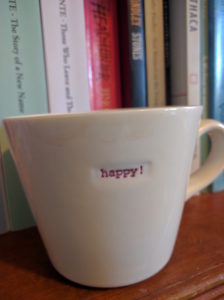 KERRY
KERRY
You are my blogging soul sister! That space to grow and evolve is so essential to successful blogging, I think (and I think a lot of bloggers who head into the gig thinking strategy and imagined outcomes are going to trip up on that). I am curious about your ideas about actually reading blogs. In my course, whenever I ask students what blogs they read, they usually shrug their shoulders and admit, “none!” Which is not to say that nobody reads blogs. I think that lots of people read blogs, but we come to them more laterally. I read food blogs all the time, but usually find them by googling whatever happens to be in my fridge and seeing what recipes result. I used to use a blog reader back in the day, but then Google ended it, and my blog reading was kind of rudderless after that—and I missed blogs. So I actively sought out a blog reader (I use protopage.com) which made reading blogs more of a regular habit. Kind of anachronistic, but I like it old school. I have a small but loyal group of readers who seem to feel just the same (and this is not JUST my mom). Anyway, I am interested in your thoughts on reading blogs and also finding readers. As you said, social media is a huge part of this.
Also, regarding the messiness: do you think it’s just too terrifying for some people to show their mess in public? Is that’s what’s driving the push toward tidy blogs? And by tidy, I mean antibacterial robot blogs? Is the blogger who’s willing to show her process taking risks that might be unwise?
**
 EMILY
EMILY
Ha! I’m glad we’re on the same page, as I often feel like I am a cranky old man about everything and no one understands 😉
Google Reader did kill blog-reading for me, in a lot of ways—remember when you could follow, like, 50 blogs? 100 blogs?! Haha, no. I don’t read a huge number of bloggers, but I have kept up with the ones who tell good stories, or who make me laugh. I love Afroculinaria, and Eating From the Ground Up, and The Pizzle, food-related blogs that offer more than just content. The thing about “content” is it’s stuff meant to fill space. How much of what we’re putting out there is valuable? How much can any one person care about? I know content when I see it, and there’s a real difference between reading something someone put thought and time into and some junk they threw up just to have a post on Tuesdays as per usual, you know? And so, I am reading fewer and fewer blogs. But the ones I am reading, I’m really invested in. Like, I would be genuinely sad if they went away. But you’re right, I don’t think people “read” blogs in the same way that they used to—I agree, I definitely come to blogs more laterally now, and I don’t often click “follow” on the blog when I find someone I like—I find them on Instagram, or on Twitter or Facebook.
I also get to say all that as someone who has been around long enough to not really have to hustle for readers. Do I need more readers? I am sure in terms of marketing books more readers would be valuable, but I am not unhappy with how I am doing, and the amount of traffic moving through the site on a daily basis, even when I don’t post very often. I recognize that the landscape is different now, and I get to be someone with cobwebs and cat hair and it’s, like, my thing. Maybe it’s not that we’re not hustling, we’ve just earned the ability to not have to? Maybe those newbies with their neat presentations and good cameras and shiny websites look at people like us, who have been around a long ass time and don’t feel obligated to bother with Pinterest, with envy?
“Maybe it’s not that we’re not hustling, we’ve just earned the ability to not have to?”
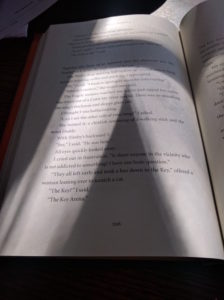 It might be scarier now to show your mess in public. Mess isn’t marketable, and I think because there are so many blogs out there now, you need to look like you know what you are doing in order to be taken seriously, or at least to be followed by people who don’t care about stuff like messiness and the creative process (which I think is most people). Another aspect of this is that a lot of these blogs are or want to be businesses—and businesses run quite a lot differently than creative projects. I want to say this in a way that doesn’t make me sound like an asshole (because I don’t mean anything offensive by it), but there’s a difference between writers and people who like to write; I think writers, or people who have always written (in the writers-as-artists sense), may value the mess and the show-of-process more than people who like to write but have other ambitions for their blogs. Writers aren’t penalized for having written shitty first drafts (or having evolved through a period of shitty-first-draftyness) because it’s expected, that’s what we do. But bloggers who want to turn blogging into something else, something beyond cookbooks or novels or whatever, maybe they approach it differently, and are more thoughtful about how they present themselves.
It might be scarier now to show your mess in public. Mess isn’t marketable, and I think because there are so many blogs out there now, you need to look like you know what you are doing in order to be taken seriously, or at least to be followed by people who don’t care about stuff like messiness and the creative process (which I think is most people). Another aspect of this is that a lot of these blogs are or want to be businesses—and businesses run quite a lot differently than creative projects. I want to say this in a way that doesn’t make me sound like an asshole (because I don’t mean anything offensive by it), but there’s a difference between writers and people who like to write; I think writers, or people who have always written (in the writers-as-artists sense), may value the mess and the show-of-process more than people who like to write but have other ambitions for their blogs. Writers aren’t penalized for having written shitty first drafts (or having evolved through a period of shitty-first-draftyness) because it’s expected, that’s what we do. But bloggers who want to turn blogging into something else, something beyond cookbooks or novels or whatever, maybe they approach it differently, and are more thoughtful about how they present themselves.
Did you see Luvvie Ajayi’s post on having been blogging ten years? She talks a bit about her process, and she had a few points I liked. This one, on evolution: “This blog has evolved with me. And my changed beliefs, my maturity and my growth as a person can be charted through the last ten years. How you start is not going to be how you continue and finish and that is okay. You are human.”
This resonated, because I think this is what’s been so great about blogging. I started out when I was 25 and still really immature in terms of my voice and my world view, and I am happy I can go back even three or four years and see that I have made progress, and that I am maybe a better version of who I was when I started. And maybe that kind of thing won’t matter to most people, but there’s a vulnerability in not being your tidiest, best-branded self and I think that resonates with the kind of readers who will stick with your writing long-term.
Follow Emily Wight on Twitter and Instagram, and stop by to read her blog.
October 7, 2016
Stepping Stones and The Journey
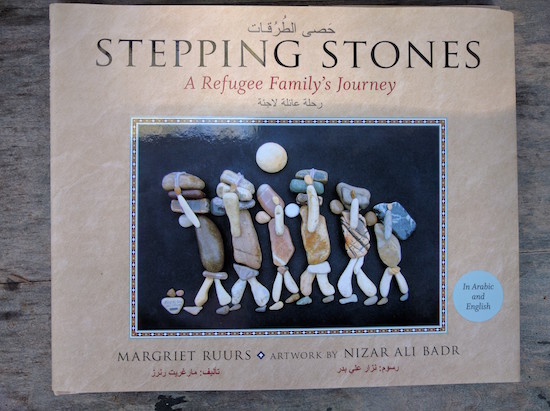
It’s not hyperbole to state that Stepping Stones: A Refugee Family’s Journey, by Margriet Ruurs and Nizam Ali Badhr, is one of the most extraordinary picture books I’ve ever encountered, a book whose incredible origin story is as remarkable as its execution.
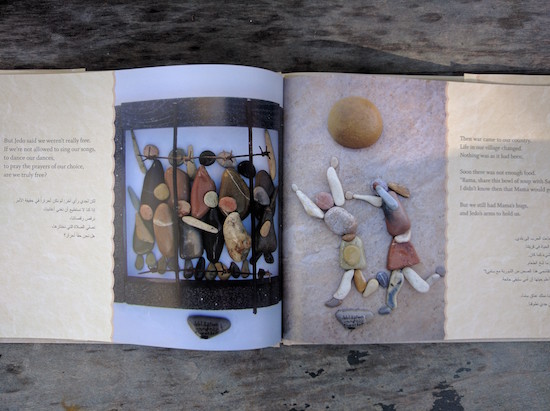
The story begins with Syrian artist Nizar Ali Badr, whose evocative scenes created from stones became popular on his Facebook page. Author Ruurs was inspired by the images and eventually managed to contact Badr, and plans were made for them to create a book together. Ruurs secured a contract with Canada’s Orca Books, who were on board with her mission that proceeds from the project be donated to an organization supporting refugees.
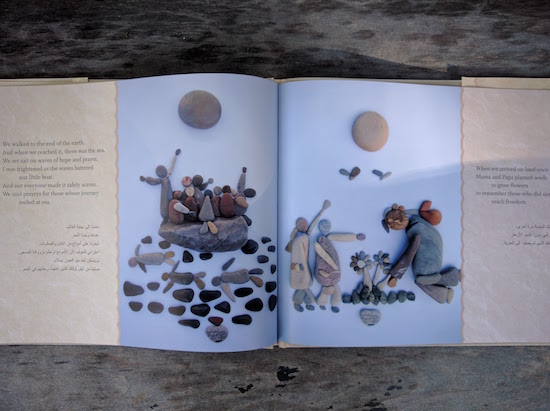
Badr’s illustrations are incredible. I never would have imagined that stones could be so creatively arranged to convey action, emotion and narrative. In her introduction to Stepping Stones, Ruurs tells us that Badr, who lives in Latakia, Syria, cannot afford the glue that would render his pictures permanent—and now his images have been collected in a book that people are going read on the other side of the world.
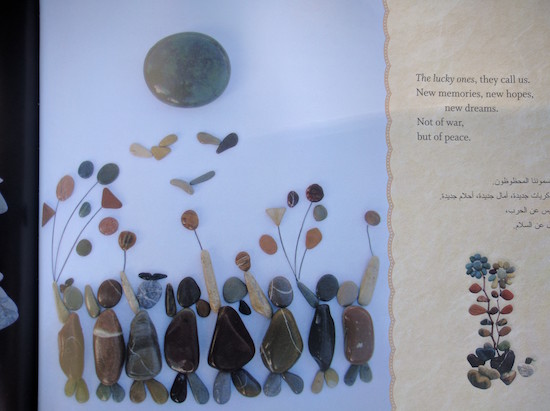
Ruurs’ story is beautifully told, narrated by a young girl whose family is forced to leave the only home she’s ever known, a place of family and friends, memories and familiar scents and sounds. They join, “A river of strangers in search of a place to be free, to live and laugh, to love again. In search of a place where bombs did not fall, where people did not die on their way to market. A river of people in search of peace.” Her text also appears on the page in Arabic, translated by Falah Raheem, making the book accessible to more readers and bring another player into this gorgeous literary transnational collaboration, a book that is very much of this moment and yet timeless at once.
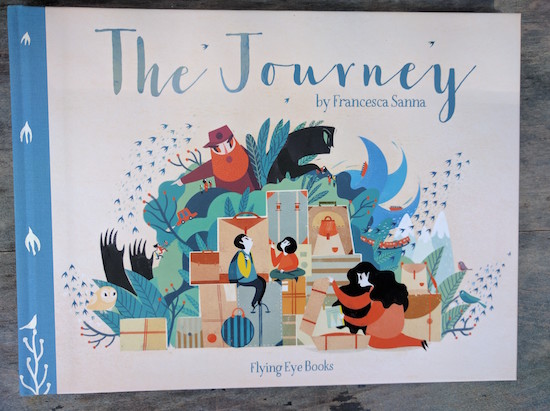
In her book, The Journey, Italian illustrator Francesca Sanna tells a similar story in a different way, a way that in narrative and images recalls fairy tales, Grimms, and an entire canon of stories about people fleeing danger, heroic quests, courage, monsters, danger in the woods, and hope out of the darkness.
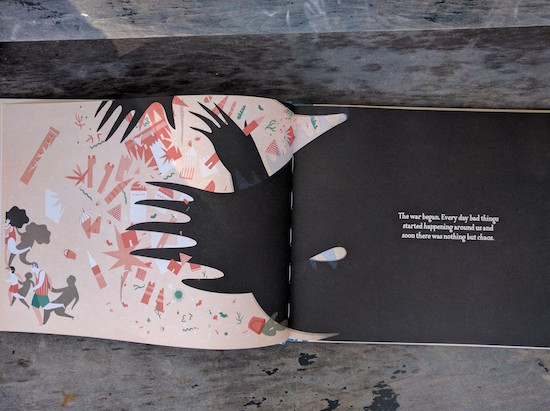
Sanna writes that her story is not meant to represent one particular kind of refugee story, but that her book is a collage of different experiences she learned about through her work at a refugee centre in Italy. The stories themselves become a jumping-off point for a narrative that is not necessarily literal, and neither are Sanna’s illustrations, which are dark and compelling (although my daughter as requested that we not read this book at bedtime…)
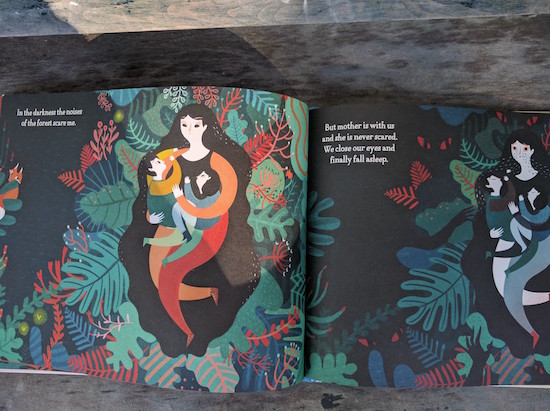
By car, on foot, by sea, and then by train, the family makes their way, encountering threats along the journey and also help from shady characters. The discerning reader’s heart breaks for the mother.
As with Stepping Stones, The Journey ends on a hopeful note, although the journey isn’t over yet: “I hope one day, like these birds, we will find a new home. A home where we can be safe and begin our story again.”
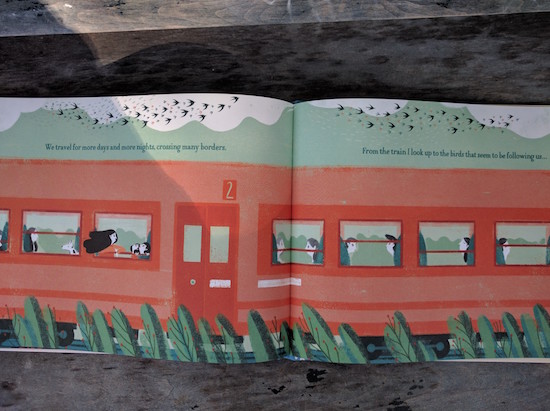
Reading these books, it occurred to me that it’s not just children who require stories like these in order to better understand current events and the world around us. Politicians, and bigots, and other grownups with hardened hearts who’ve forgotten how to be human—these are the readers who need to read these books in order to remember that people are people, some things are universal, and also that books are amazing.
October 6, 2016
Mad Men: Season Five
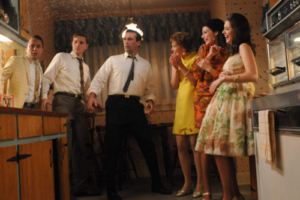
We’re still rewatching Mad Men, now midway through Season 5. From here on in, I’ve only seen these episodes once before, never feeling as compelled to see them again as I did with Seasons 1-3 which, it was true, were working on a very different level. I’ve even stopped taking copious notes as I watch because a) why was I taking notes in the first place b) I’ve started winter knitting projects, and I’ve not yet found way to knit and take notes (although I’m working on it) and c) I’m finding these later seasons don’t require the same puzzling-out that the earlier ones did. Characters’ motivations are clearer, the whole sense of the show is more familiar, and perhaps it’s less textured. These later seasons don’t have the same sense of grand wholeness as the others, as though these pieces are all part of a larger, and deeply intricate project. These later seasons get a bad rap too, the general sense being that things went downhill after Season 3. In a way it’s true, yet the show is still fascinating, and even more importantly (and what we were not anticipating): whenever we finish an episode we find ourselves saying, “Oh, that was was so good.”
It’s true that I was always most invested in Don and Betty as a unit, and remained as such for the rest of the series, and even though they’re both so terrible (for themselves and each other) I cherish their moments of connection after their divorce. How Betty calls Don when she learns she has a lump on her thyroid (although I notice this time that she comes home from the doctor calling for Henry, and it’s only when she can’t find him that she calls Don; she’s actually just looking for somebody to cling to, it’s not personal): “Say what you always say,” she tells him, commanding him to promise her that everything is going to be okay.
Megan Draper never really looked for me, not an actual character as much as a cipher, although this time I’m working with that and thinking that this is part of the point of her. I was always bothered by the way she seemed to be a (poorly-written) character whose personality forms as the show goes on, rather than seeming like a human being with a life behind her. But regarding this less as a problem and more of the general scheme of things has been interesting—this might be the one thing she has in common with her husband, actually, and what about her appeals to him. “Maybe I’ll be a copywriter? Maybe I’ll be an actress?” It’s kind of annoying, but I wonder if Don admires that openness, all her possibility. That they are both inventing themselves as they go—but her with such an open heart, the kind of generosity (to herself and the world) that he’ll never be able to conjure.
Ken Cosgrove has become an excellent man, just the way I remember him. The only decent guy of the lot. Shocking to rewatch Season 1 earlier this year and realize that he was thoroughly terrible. But he evolves, as Harry Crane devolves. Seeing Peggy and Stan together is really wonderful—it’s all inevitable. And I admire her character so much, and Joan too. That they aren’t binary characters—the show is so much more complicated than that. And poor Lane Pryce. There really isn’t more on that I need to say.
Season 5 is interesting, but just a little bit boring as Don struggles to behave, the tension there palpable. It’s weird though, his insistence on making this marriage work, because he doesn’t seem all that happy in it. Megan makes him seem old. Next season, it all goes wrong again, and he starts bonking his neighbour, and I might have to start taking notes again, trying to answer what has always been the question: “What IS Don Draper thinking?”
For now, whatever he’s thinking, I’m pretty sure it’s something grim.
October 4, 2016
Goodbye, Guardian Swim.
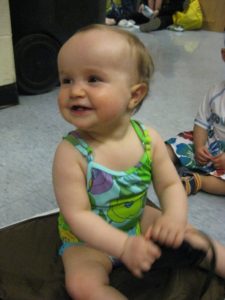 When Harriet was a baby, we had no money but plenty of time, and so instead of enrolling her in swimming lessons as the swishy pool near our house (with salt water and everything!) I signed up for cheap swimming lessons at the city-run pool that was far away and at the top of the only hill in this entire city. It was better than joining a gym, I decided, and only cost $33 dollars, and so began my Guardian Swim years, which is the more inclusive name for the Parent and Tot program I remember from my own childhood.
When Harriet was a baby, we had no money but plenty of time, and so instead of enrolling her in swimming lessons as the swishy pool near our house (with salt water and everything!) I signed up for cheap swimming lessons at the city-run pool that was far away and at the top of the only hill in this entire city. It was better than joining a gym, I decided, and only cost $33 dollars, and so began my Guardian Swim years, which is the more inclusive name for the Parent and Tot program I remember from my own childhood.
In the beginning, I was very excited. In the beginning, I find, parents need to strive in order to enact parenthood properly (luckily, many of us outgrow this compulsion) and guardian swim was one way to do so. It was also something to do with my baby that didn’t involve me lying on the carpet being bored out of my mind. It got us out of the house. (The idea that there was a time in my life when I was desperate for excuses to “get out of the house” distresses me now. That sounds awful. I never want to be that person ever ever again.) I am sure I found the first lesson exhilarating. Fortunately, I was never that poor parent whose baby screamed throughout the entire lesson every week and eventually we had to give up going swimming altogether, $33 dollars sadly to waste. Harriet liked the water, I liked having something to do, and so we did it, session after session. I have done “The Fish Wishy” so many times.
Oh, Guardian Swim. Once in a while I signed up for you, and the first class would have this terrific, dynamic teacher with lots of games, songs and ideas, and every time we met that teacher, she or he taught the one class and we never saw them again. Most of the other instructors had a short repertoire, and then would grant the class “free time,” and my baby and I would flounder aimlessly in the pool watching the clock until it was time to go home. There would be plastic toys, and the children would be drawn to them, but once the baby had a toy boat in hand, there wouldn’t be so much to do.
My most favourite part of Guardian Swim was when my husband took the baby into the pool, and I sat poolside reading a book. My least favourite part was when the instructor would give us an obligatory educational session, like how we shouldn’t leave our babies unattended by backyard pools or feed them marbles in case they choked. I also wasn’t big into the times that people pointed out that swim diapers contain faces but not urine, the thing that most of were trying really hard not to think about. There was the sessions with Shaheed, who was the worst teacher ever, and often would forget to come class, never mind that I’d climbed that hill and got my kid ready for it (and got out of the house even—no small feat) and when we got there and he wasn’t, they wouldn’t let us get in the pool. The seventeen-year-old lifeguard would shrug, no idea about my sacrifice—”Nothing I can do,” he’d say.
From Guardian Swim, I learned that I should get dressed before my child does, otherwise she will take her dry-clothed-self and sit right down in a puddle on the change room floor. I learned that she could play with my keys while I got changed, and be sufficiently entertained. She learned how to blow bubbles and how to kick her little legs. I learned not to feed her marbles. Nobody, however, ever learned to swim.
When Harriet was nearly four, she was still in Guardian Swim. I look back upon this with the confusion many parents do when they consider their experiences with their first child. Why were we still doing that? I think part of the problem was that she was terrified of us letting go of her in the water, and clung to me so hard it strangled. She wasn’t comfortable, and neither was I. I was waiting for something to happen, something to happen that would allow us to progress, but that something never arrived. The last time I signed Harriet up for Guardian Swim at the pool at the top of that great big hill, I was very pregnant, and I’d never considered the agony of pushing a stroller with a four-year-old up at that hill in such a condition. It was terrible. Harriet wasn’t learning anything, and there was a six-month-old baby in her class who had better technique than she had. Something was going to have to change.
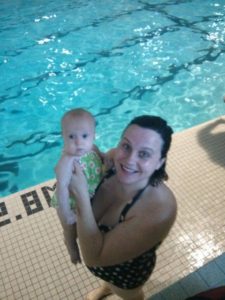 When Iris was born, we were no longer broke. Not only could we afford the salt-water pool, but the convenience seemed worth every penny. Harriet began a swim program that wasn’t geared to infants, and it was Iris’s turn for Guardian Swim. Which I think she was enrolled in three times total. Because neither of us felt like getting in the pool, and it was always cold, and she always had a cold. I was tired of doing the fishy wishy.
When Iris was born, we were no longer broke. Not only could we afford the salt-water pool, but the convenience seemed worth every penny. Harriet began a swim program that wasn’t geared to infants, and it was Iris’s turn for Guardian Swim. Which I think she was enrolled in three times total. Because neither of us felt like getting in the pool, and it was always cold, and she always had a cold. I was tired of doing the fishy wishy.
We moved to the nearby university pool eventually (spoiled for pool choice, I know) because Harriet needed some help getting caught up and the shallow teaching pool gave her more confidence. The half hours we passed in that pool during Iris’s classes could possibly be scientifically proven to be the longest 30 minutes on record. Even though Iris could actually swim. Like, she was leaping out of our arms and we kept having to catch her before she sunk, and if we’d been daring enough not to bother, she might have floated after all.
By this point, we hated Guardian Swim. It was unfathomably boring. The other children were annoying. The teachers were children. Every week we’d go, and I’d cross my fingers for a pool fouling so we could go home early.
But finally, we have arrived. Last week Harriet began her first swim lesson in the “big pool” upstairs, and she was the first kid in her class to jump in the water (when once upon a time, she was vehemently opposed to such things, and I used to berate her about it, made her practice jumping off the bottom step of our staircase until she cried—not my finest moment as a parent, and it turns out her instructor was right when he suggested we leave her alone and she’d figure it out in time). And Iris started Sea Turtle, the first level post-Guardian Swim, and she was amazing, dunking her head and floating on her back, and these things that she would never have been brave enough to do had I been in the pool alongside her.
And me? I was where I’d always been waiting to be, cheering along poolside, content in the company of an excellent book. So happy with the progress, which is generally where I tend to be in terms of parenting, not looking back in sadness but just so happy to be moving on. Enjoying the ride. “Little girls get a little less little but instead of it feeling sad, it feels exhilarating,” writes Rebecca Woolf on the occasion of her daughter’s eighth birthday, and I love that idea.
Why not embrace the momentum, because it’s not going anywhere—but you are.
October 3, 2016
The Break, by Katherena Vermette
 Katherena Vermette, who won the Governor General’s Award for Poetry in 2012 for her collection North End Love Songs, is demonstrating that winning writing need not be constricted by form—her debut novel, The Break, which has all the suspense and plot of of a thriller while not sacrificing literary richness, is a finalist for this year’s Rogers Writers’ Trust Fiction Prize. It’s a novel whose pieces are disassembled in the beginning, and a most ambitious project—a story told from so many points of view. A woman sees a crime being committed from her window one cold dark night; we see young girls getting ready for a party; another teenager has walked out of her juvenile detention centre; two sisters negotiating rich but complicated adult lives; their mother whose own sister died years before, another Native woman who became a statistic. And then their mother, growing old and frail, at the back of her children and grandchildren’s minds, but a constant. The dead woman too has a voice in this story, and it is her daughter who sees the disturbing scene out her window, blood in the snow that will be covered by morning.
Katherena Vermette, who won the Governor General’s Award for Poetry in 2012 for her collection North End Love Songs, is demonstrating that winning writing need not be constricted by form—her debut novel, The Break, which has all the suspense and plot of of a thriller while not sacrificing literary richness, is a finalist for this year’s Rogers Writers’ Trust Fiction Prize. It’s a novel whose pieces are disassembled in the beginning, and a most ambitious project—a story told from so many points of view. A woman sees a crime being committed from her window one cold dark night; we see young girls getting ready for a party; another teenager has walked out of her juvenile detention centre; two sisters negotiating rich but complicated adult lives; their mother whose own sister died years before, another Native woman who became a statistic. And then their mother, growing old and frail, at the back of her children and grandchildren’s minds, but a constant. The dead woman too has a voice in this story, and it is her daughter who sees the disturbing scene out her window, blood in the snow that will be covered by morning.
The family tree at the beginning of the book is useful, but the reader soon becomes acquainted with the women of this family, so it won’t be referred to throughout. Momentum is strictly forward as the pieces begin to come together, Vermette deftly moving in and out of time to create a three-dimensional feel to the narrative—we come to feel we know this story from all sides. Four generations of a family, and how tragedy trickles down with all the goodness, the former not negating the latter though. As Vermette has made clear, this is a novel about women and about survival, a story that complements but also takes issue with stories and statistics about First Nations and Metis women as victims before they’re even people proper. But her characters are people here, people with flaws and foibles, strengths and weaknesses, and it’s the strength that endures: “‘It’s okay, my girl. It’s okay.’ Her answer to everything.”
Though that strength too—that will to survive—is a power that Vermette shows can be used for better as well as worse; women indeed contain multitudes both within themselves and amongst each other. The great power of this book is that it shows that.
The Break is a compelling, gripping and wholly necessary novel. I’m glad it’s receiving the praise and attention it deserves.
October 2, 2016
I don’t care about Donald Trump.

I don’t care who Elena Ferrante is. Not one iota. Having read her books, I feel as though she’s given us everything a person might be required to—and more. Which is why I retweeted such a sentiment this morning, only to have a complete stranger respond to the conversation with a (man)admonishment: “lots of things to get angry about this morning and you settled on this…” A complete stranger whose timeline is non-stop Donald Trump. Donald Trump: who I don’t care about even more than I don’t care about Elena Ferrante.
I don’t care about Donald Trump. I don’t care about his stupid hair, or his weak-chinned son, or his parade of wives. I don’t even care about his taxes. There is nothing at all that I could learn about Donald Trump that will confirm anything about him that I don’t know already. I don’t care about his tweets. I don’t care about his Russian ties. I don’t care about his reality TV and his insecurities and his mystique or his appeal. I don’t care about his fucking stupid ball cap. When I never have to see his hideous smirk again, it won’t be a moment too soon.
I don’t care about Donald Trump, and only partly because I don’t live in America and my interest or lack of in its politics has no bearing upon what happens there. I don’t care about Donald Trump, because the same people who pontificate via their Facebook platforms about the shallowness of celebrity culture and the vapidness of teenage girls fixated on selfies are glued to his every move. I don’t care about the debates, which will teach viewers nothing remotely interesting or insightful. I don’t care about Donald Trump, because I’d rather read a novel by Elena Ferrante and also for the same reason I’d rather not read a novel Philip Roth or Martin Amis, or anyone who is determined that the purpose of literature is to “be the axe for the frozen sea within us.”
I am so fed up with maleness, Donald Trump its chief emblem. I am so fed up with nothing being as important as war, except sports, which is a microcosm of the same. I am sick of war rooms and chicanery, and heartless people who proclaim themselves heroic for “making tough decisions.” I am sick of credit being given to contemporary neanderthals for “evolving”—the rest of us did that millennia ago. I am so tired of the sexism, blatant and systemic. For the absolutely shit that women have to go through every day, whether they’re running for office or working in an office. I am tired of valid, heroic protests (a man kneeling during a national anthem, just say) being more controversial than a police officer shooting an innocent person. I am tired of this perception that a life matters more if a person who wore a uniform lived it. The body of a brilliant artist pulled out of a river, and the police officer who racistsplains it all on Facebook. I am tired of Trump and all the other blowhards in pursuit of power (Canadian Conservatives, you people who have no shame and no lows you won’t go to, that would be you) and making all the racist assholes feel pretty comfortable with their points of view in 2016, I am so absolutely tired of the people who are totally loving this train wreck of a presidential election, and feeling morally superior for their attention to it—this is politics, current events, the pursuit of “social justice.” All of you are complicit in making the world a more terrible place.
Naturally the obvious question would be that if I truly did not care about Donald Trump, why indeed have I just written an entire post about not caring about him. A question to which I reply, fervently, as much I don’t care about Donald Trump, I care so very, very much about not caring about him.
So very much that if you need me, I will be reading a giant novel.
Written by a woman.
September 29, 2016
GIVEAWAY! A Squiggly Story, by Andrew Larsen and Mike Lowery
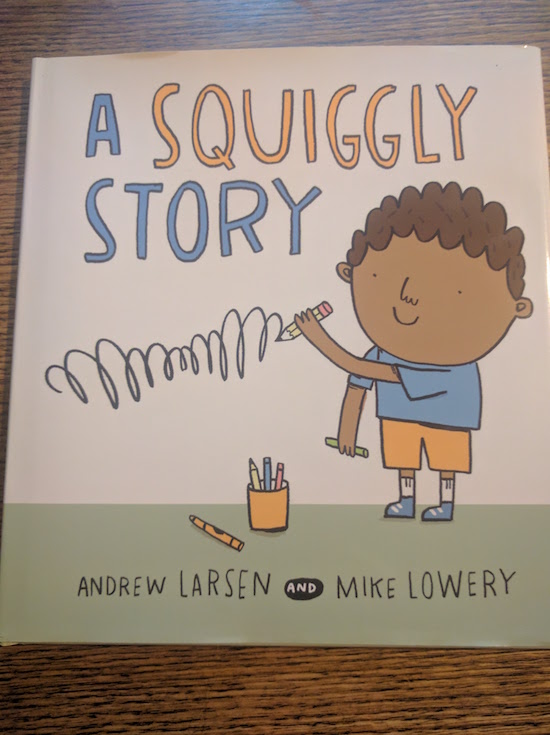
Before my daughter Harriet went to junior kindergarten, she was determined to never be taught anything—by me, at least. I’d read somewhere that a child entering school should be able to write her name, and so that was a benchmark, but Harriet was having none of it. She didn’t even draw pictures. The only thing she ever had to do with paper was taking a pair of scissors and cutting paper into a million tiny pieces, scattering them across our carpet like cheerios.
She did, however, have a notebook, and this was the only bit of “writing” she was willing to be known for, filling page after page with curly lines, the closest she’ll ever get to cursive.
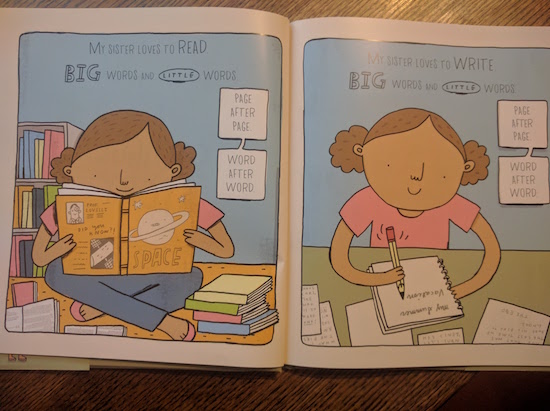
And then she went to school, and it was there the magic happened. Somehow our girl learned to write and to read, and she reads all the time and everywhere, and she writes all the time too (even if her handwriting is atrocious). She makes comics and stories, and she and her friend have written a book at school that they’ve read to kids in the other grade two classes.
And because of Harriet’s example, and because she’s a different person altogether, Iris has a completely different relationship to text and writing than Harriet did at her age. Iris draws amazing pictures, and sits flipping through page after page in novels, and she’s learning her letters—when she sees an “S”, she will shout, “My Daddy has that one,” as if it were some sort of affliction. She knows her classmate’s initials and becomes indignant when a word beginning with A does not actually spell Alma, as it tends to at school.
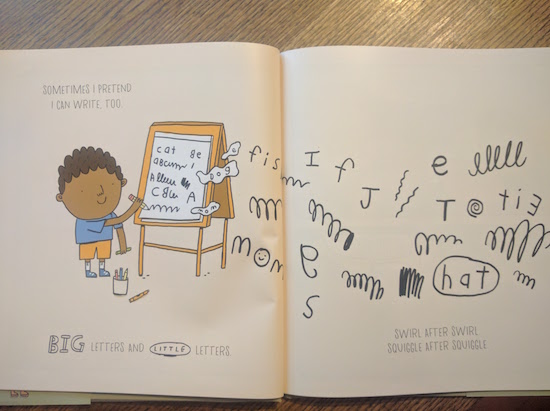
Most of all though, Iris is partial to her own letter, which is I, and her sister’s H. That the letters fall side-by-side in the alphabet did certainly occur to me when we named Iris, and I also love that an H is an I sideways. They’re often found together in words as well, and Iris is delighted by all of this, finds it intensely meaningful.
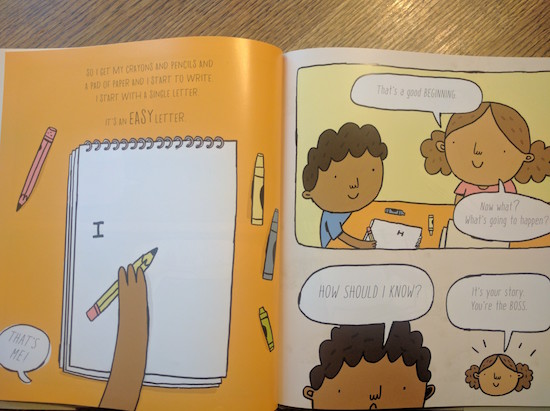
So you can imagine how Iris felt when she saw the above page in Andrew Larsen’s latest picture book, A Squiggly Story, illustrated by Mike Lowery. I is, of course, a letter than is intensely personal to anyone narrating their own experience, but Iris simply took for granted that this was a book that was created just for her.
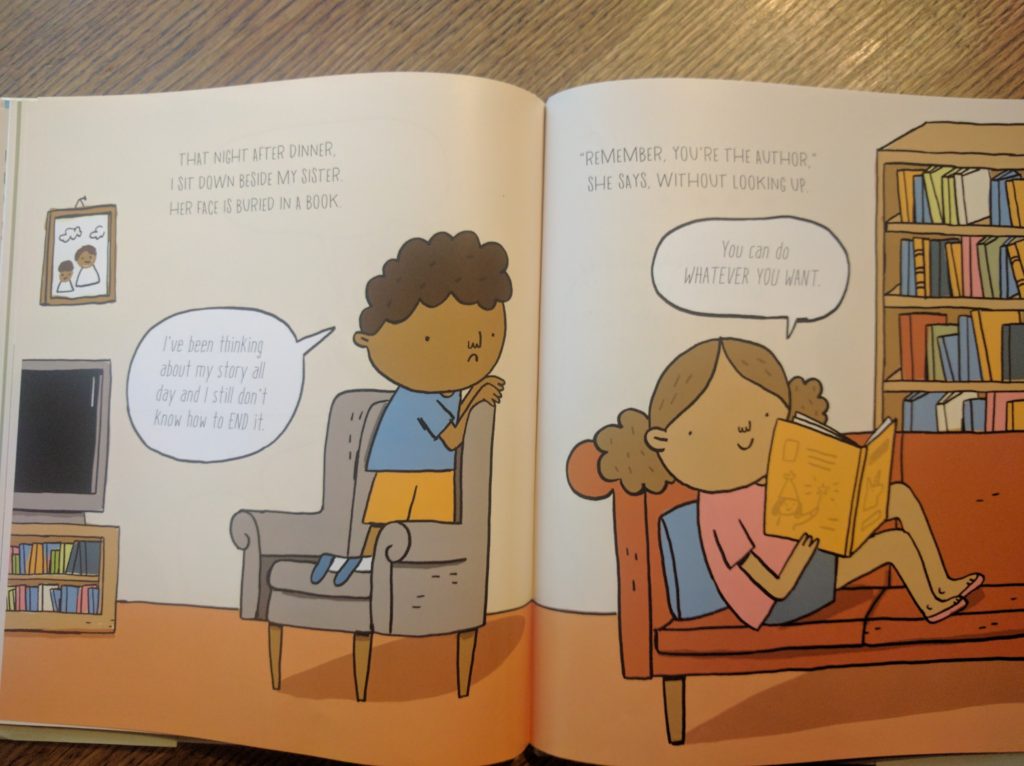
And in a way it was, a book just for her, among many other readers. It’s about a boy who longs to be as deft with words and letters as his older sister, to write a story, and she tells him there’s no reason why he can’t—even if he doesn’t know how to write words yet. “Every story starts with a single word,” she tells him, “and every word starts with a single letter.” This breaking down into smaller pieces concentrated on one step after the other (and another after that) being the best writing advice I know.
So the boy begins his story, a story with I’s and circles and an upside-down V (i.e. a shark fin! This is not a boring story). Empowered by his own creation, the boy takes his story to school and shares it with his classmates, inspiring them to come up with stories of their own and suggestions for his ending. And coming up with one story, of course, makes him think about what kind of story he’s going to imagine next, and the possibilities are endless—a squiggle can be so many different things.

Andrew Larsen is my friend and we’ve had many good discussions about books and writing, and one topic we keep returning to is our distaste with the idea that the outcome of a narrative should necessarily be a protagonist learns a lesson—it’s such a simple minded approach to the role of story in our lives and our experiences. And I love that Andrew’s work reflects this—his are stories that serve to illuminate rather than preach. But a very cool twist is that within his stories I do always find a worthwhile lesson for me, the grown-up reader, to ponder.
“Remember, you’re the author,” the boy’s sister tells him. “You can do whatever you want.”
Fine advice in the writing of a story, but also in the making of a life.
GIVEAWAY: I have an extra copy of A Squiggly Story that you can have a chance to win. Comment on this post and tell me your favourite punctuation mark, and why you love it, and you will be entered in a draw. Canadian residents only. Giveaway closes October 14. October 20.
September 28, 2016
American Housewife, by Helen Ellis
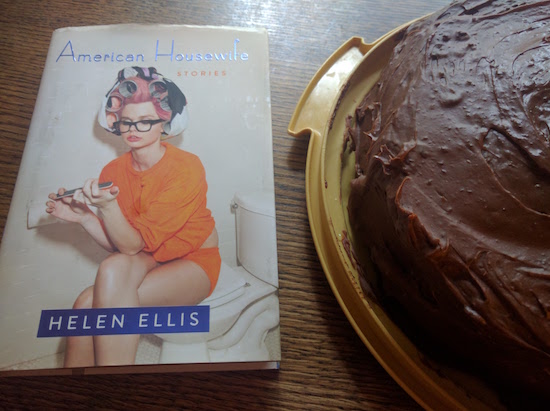
I bought Helen Ellis’s American Housewife after reading about it plenty, and then reading more in Laura Miller’s article on Housewife Fiction (which led me to Diary of a Mad Housewife, by Sue Kaufman, which I loved so much and should surely be brought back into print). I bought it at Ben McNally Books after asking at the counter for a book “with a woman in rollers on the cover, written by someone whose first name is Helen” (because I have become that bookshop patron as my mind begins to fade), and they found it for me. I read it sometime in the summer, but didn’t write about it here, not because it was insubstantial necessarily, but because it was so digestible that I didn’t really need to work through it. Reading this book was like reading a magazine, which I think was meant to be part of its appeal, with the lists scattered throughout between stories and numerous pieces with a didactic bent i.e. “How to be a Grown-Ass Lady” or “How to Be a Patron of the Arts.” There was a surface the reader could skim, is what I mean, though there is more going on if the reader dares to probe deeper.
But there is a limit to the probing (this is not a sexual metaphor, you pervert) because this book is pretty short. It is the most terrific package, a miniature hardcover, cute cover, appealing design on the spine. It is easy to objectify this book and to appreciate it, and yet my book club colleagues who work in publishing were confused about it. People don’t buy short stories, they affirmed, and yes, this is a slight book, but it’s a hardcover, more than 30 dollars. Who was meant to be a audience? Well, me, I thought, although I also know that my singlehanded efforts to support the publishing system have not been seeing the results I’ve been hoping for, so perhaps that wasn’t the most excellent plan.
Anyway, this book is intriguing. It fascinates me that it was borne of a Twitter account (@WhatIDoAllDay), and the resulting snappiness of the book’s contents. It intriguingly plays with the line between autobiography and fiction (in the way that social media in general does) and I’m interested in domesticity as divorced from motherhood, which we don’t see very often. For many women, motherhood offers a direction to one who is otherwise lacking such a thing (for better or for worse) but what do women do if they don’t pursue that option? There is a scathingness to the writing here, and my book club friends wondered just who was being satirized, and if Ellis was reviling her very readers (middle age ladies in book clubs) but I argued that she was implicating herself. This is a book about wanting to write and not writing, or else writing but not being being published (the distinction Ellis describes as the distance between Wimbledon and hammering a tennis ball against the garage door), its about the paralysis of too much choice and women’s roles and living with failure and compromise, and it’s funny, nasty and kind of amazing. We loved its Southern lady/Southern gothic vibe, and the Shirley Jackson darkness, and that John Lithgow appears as a character. I like that Helen Ellis is also a professional poker player, which seems at odds with her southern lady persona, but that is the point of southern lady personas, I think, the surprises that lie beneath an exterior of conventionality. The same could be said of the book. We all had different stories we’d connected with and others not so much, and there was so much to think about, and argue about, and even to agree upon.
And afterwards, we all ate cake.
September 26, 2016
The Dependent, by Danielle Daniel
 I have tremendous admiration for author/illustrator Danielle Daniel, whose picture book, Sometimes I Feel Like a Fox, was one of the best picture books I encountered last year, a finalist for the First Nations Community Reads Awards, and which has recently been nominated for the prestigious Marilyn Baillie Picture Book Award. And so when I learned she’d written a memoir, I know I wanted to read it.
I have tremendous admiration for author/illustrator Danielle Daniel, whose picture book, Sometimes I Feel Like a Fox, was one of the best picture books I encountered last year, a finalist for the First Nations Community Reads Awards, and which has recently been nominated for the prestigious Marilyn Baillie Picture Book Award. And so when I learned she’d written a memoir, I know I wanted to read it.
The Dependent is a memoir about her remarkable marriage, a relationship that begins when a headstrong Women’s Studies major meets a handsome guy in the Canadian army, and they embark upon an adventure together that requires plenty of compromise on her part. Daniel doesn’t fit the traditional mould of an army wife, and is continually frustrated by the army’s demands upon her family and also her husband’s willingness to do as the army required in order to further his career. She writes with brutal honesty about her anger and also about her experiences with depression, which begin in this memoir after she experiences a miscarriage. She also alludes to a troubled family background that colours her experience of the present and makes her a jealous and mistrustful partner. Her husband Steve, however, does not have a lot of sympathy for his wife’s point of view—like a good soldier, he doesn’t delve into complicated emotions and focuses on his mission, one thing after another. He is frustrated that his wife does not seem to have ability to work through her unhappiness.
9/11 changes the stakes for members of the military serving around the world, and so too for Danielle does the birth of her son—although Steve leaves home for three months just weeks after the birth. She is relieved when Steve finally receives a position in Canada that keeps him from having to serve overseas, but what she thinks is to be their happy ending turns into another kind of story when Steve is injured in a parachute jump and is left a paraplegic. Suddenly Danielle is no longer married to the army—and in fact the support offered to their family is almost laughable inadequate—but her husband’s disability is something new and just as complicated to navigate. What makes the book so interesting is that Steve rebounds from his injury the same way he does from everything, and the dynamics of their marriage remain unchanged: Steve goes back to school, begins to train as an athlete training for the Paralympics, and becomes a local celebrity. Meanwhile Danielle is lost is the same shadows that had been following her for years, not to mention her husband is altogether dependent on her in so many ways, and she doesn’t know who she is beyond his wife. She is angry with Steve and with the army from what it stole from them, and tired of years of compromise, and Steve is understandably upset that she is wallowing in her pain all the while he’s the one who’s been injured. He doesn’t understand that she’s been a victim too.
Years of simmering tensions come to ahead eventually, and getting to this point makes for a fascinating read. I was impressed how surprising the dynamics were between Steve and Danielle, complicated by the fact that they’re two actually human beings with all the baggage and complexities inherent. While some of the dialogue between them seemed awkward and stilted, containing the same kinds of arguments over and over (which is a marriage problem as well as a narrative one), that would be my one criticism of The Dependent. What blew me away about it, however, was its structure, Daniel’s remarkable deftness with chronology, which makes me think of her art, collage, layers and textures. The Dependent is not told in chronological order, but instead weaves in and out of time (because the idea of time as a line is a point the narrative itself serves to refute. We carry all this stuff with us). The playing with time and story, the giving and withholding of detail, is stunningly accomplished, which is only underlined by the book’s incredible, miraculous and beautiful ending, which is also its beginning, a fantastic, complicated and beautiful love story, and isn’t that always the way…
